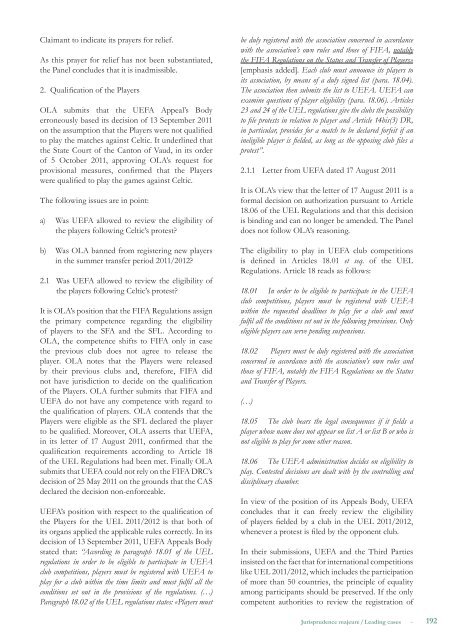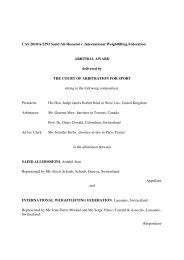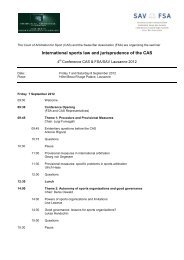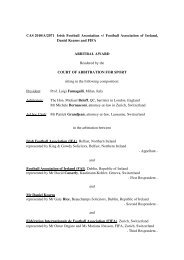(CAS) Bulletin - Tribunal Arbitral du Sport / TAS
(CAS) Bulletin - Tribunal Arbitral du Sport / TAS
(CAS) Bulletin - Tribunal Arbitral du Sport / TAS
You also want an ePaper? Increase the reach of your titles
YUMPU automatically turns print PDFs into web optimized ePapers that Google loves.
Claimant to indicate its prayers for relief.<br />
As this prayer for relief has not been substantiated,<br />
the Panel concludes that it is inadmissible.<br />
2. Qualifi cation of the Players<br />
OLA submits that the UEFA Appeal’s Body<br />
erroneously based its decision of 13 September 2011<br />
on the assumption that the Players were not qualifi ed<br />
to play the matches against Celtic. It underlined that<br />
the State Court of the Canton of Vaud, in its order<br />
of 5 October 2011, approving OLA’s request for<br />
provisional measures, confi rmed that the Players<br />
were qualifi ed to play the games against Celtic.<br />
The following issues are in point:<br />
a) Was UEFA allowed to review the eligibility of<br />
the players following Celtic’s protest?<br />
b) Was OLA banned from registering new players<br />
in the summer transfer period 2011/2012?<br />
2.1 Was UEFA allowed to review the eligibility of<br />
the players following Celtic’s protest?<br />
It is OLA’s position that the FIFA Regulations assign<br />
the primary competence regarding the eligibility<br />
of players to the SFA and the SFL. According to<br />
OLA, the competence shifts to FIFA only in case<br />
the previous club does not agree to release the<br />
player. OLA notes that the Players were released<br />
by their previous clubs and, therefore, FIFA did<br />
not have jurisdiction to decide on the qualifi cation<br />
of the Players. OLA further submits that FIFA and<br />
UEFA do not have any competence with regard to<br />
the qualifi cation of players. OLA contends that the<br />
Players were eligible as the SFL declared the player<br />
to be qualifi ed. Moreover, OLA asserts that UEFA,<br />
in its letter of 17 August 2011, confi rmed that the<br />
qualifi cation requirements according to Article 18<br />
of the UEL Regulations had been met. Finally OLA<br />
submits that UEFA could not rely on the FIFA DRC’s<br />
decision of 25 May 2011 on the grounds that the <strong>CAS</strong><br />
declared the decision non-enforceable.<br />
UEFA’s position with respect to the qualifi cation of<br />
the Players for the UEL 2011/2012 is that both of<br />
its organs applied the applicable rules correctly. In its<br />
decision of 13 September 2011, UEFA Appeals Body<br />
stated that: “According to paragraph 18.01 of the UEL<br />
regulations in order to be eligible to participate in UEFA<br />
club competitions, players must be registered with UEFA to<br />
play for a club within the time limits and must fulfi l all the<br />
conditions set out in the provisions of the regulations. (…)<br />
Paragraph 18.02 of the UEL regulations states: «Players must<br />
be <strong>du</strong>ly registered with the association concerned in accordance<br />
with the association’s own rules and those of FIFA, notably<br />
the FIFA Regulations on the Status and Transfer of Players»<br />
[emphasis added]. Each club must announce its players to<br />
its association, by means of a <strong>du</strong>ly signed list (para. 18.04).<br />
The association then submits the list to UEFA. UEFA can<br />
examine questions of player eligibility (para. 18.06). Articles<br />
23 and 24 of the UEL regulations give the clubs the possibility<br />
to fi le protests in relation to player and Article 14bis(3) DR,<br />
in particular, provides for a match to be declared forfeit if an<br />
ineligible player is fi elded, as long as the opposing club fi les a<br />
protest”.<br />
2.1.1 Letter from UEFA dated 17 August 2011<br />
It is OLA’s view that the letter of 17 August 2011 is a<br />
formal decision on authorization pursuant to Article<br />
18.06 of the UEL Regulations and that this decision<br />
is binding and can no longer be amended. The Panel<br />
does not follow OLA’s reasoning.<br />
The eligibility to play in UEFA club competitions<br />
is defi ned in Articles 18.01 et seq. of the UEL<br />
Regulations. Article 18 reads as follows:<br />
18.01 In order to be eligible to participate in the UEFA<br />
club competitions, players must be registered with UEFA<br />
within the requested deadlines to play for a club and must<br />
fulfi l all the conditions set out in the following provisions. Only<br />
eligible players can serve pending suspensions.<br />
18.02 Players must be <strong>du</strong>ly registered with the association<br />
concerned in accordance with the association’s own rules and<br />
those of FIFA, notably the FIFA Regulations on the Status<br />
and Transfer of Players.<br />
(…)<br />
18.05 The club bears the legal consequences if it fi elds a<br />
player whose name does not appear on list A or list B or who is<br />
not eligible to play for some other reason.<br />
18.06 The UEFA administration decides on eligibility to<br />
play. Contested decisions are dealt with by the controlling and<br />
disciplinary chamber.<br />
In view of the position of its Appeals Body, UEFA<br />
concludes that it can freely review the eligibility<br />
of players fi elded by a club in the UEL 2011/2012,<br />
whenever a protest is fi led by the opponent club.<br />
In their submissions, UEFA and the Third Parties<br />
insisted on the fact that for international competitions<br />
like UEL 2011/2012, which includes the participation<br />
of more than 50 countries, the principle of equality<br />
among participants should be preserved. If the only<br />
competent authorities to review the registration of<br />
Jurisprudence majeure / Leading cases<br />
-<br />
192





